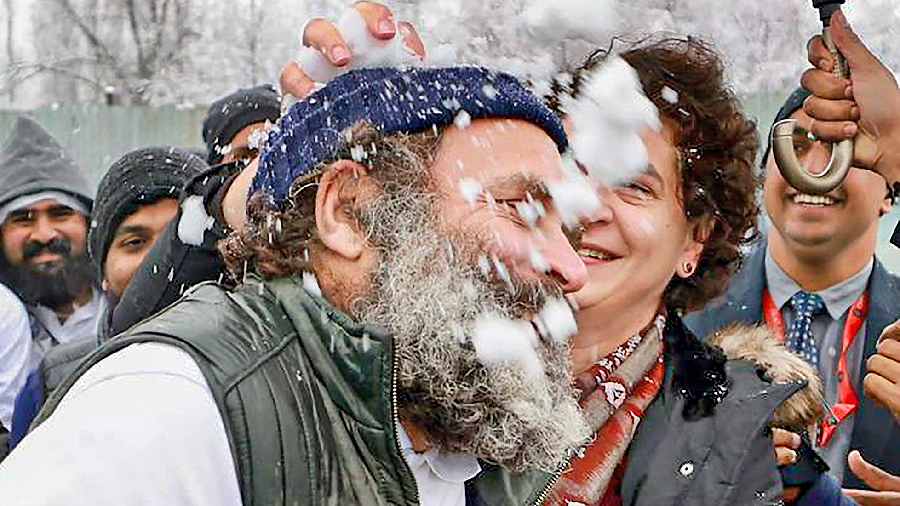Rahul Gandhi on Monday sought to create moral pressure on the RSSBJP by contending that their politics was wrong in terms of religious understanding, philosophical outlook as well as reliance on violence to accomplish the professed goals.
Addressing a public rally in Srinagar amid heavy snowfall, Rahul subtly tried to expose the flaws in the RSS thinking by contending that India’s religious and philosophical traditions drive an individual towards introspection and discovery of the self, ego-less consciousness and shunyata (void), a form of enlightenment that liberates him or her from worldly temptations.
Although such vague expositions mean little in realpolitik, the Congress leader understands the political necessity of disengaging Hindus from the RSS, which has brazenly used religion for grabbing power.
What Rahul was trying to explain to the Hindus across the country was that the distorted RSS interpretation of Hinduism was driving the community towards a disastrous path.
He referred to lord Shiva while insisting on the importance of self-discovery, saying that attack on one’s own ego — described differently as shunyata or fanaa — was explained by great souls in different cultures, be it Narayana Guru in Kerala, Sankardev in Assam, Basava in Karnataka, Jyotiba Phule in Maharashtra.
He said this thread can be found from Buddha to Mahatma Gandhi and the violent hegemonic politics in the name of Hinduism was an oddity.
Stressing one-ness, a different metaphor for unity in diversity, as manifested through the constitutional principle of equality, Rahul tried to convey a profound message that a good Hindu will not support the divisive agenda. He contended that the common cultural thread that binds India together cannot be broken by imposing uniformity on a country that celebrates pluralism.
Interpreting the Pulwama tragedy in terms of the sufferings of the families of the CRPF jawans who were killed, he sent out a message to the terrorists and the Kashmiri youth about the futility of violence. He decried State oppression and vindictive politics by naming the Prime Minister, home minister and national security advisor.
He took a Gandhian position by forcefully contending that he doesn’t want families of forces as well as citizens to get unpleasant phone calls.
The perception that Rahul wasted a political opportunity to confront the Modi government by delving into philosophical discourse is flawed because he was hitting at the core strength of the RSS-BJP, which is the Hindu majoritarian belief that they represent their religious interest.
By contending that the RSS position was neither in tune with religious values nor cultural traditions, he was trying to demolish the base on which the BJP stands.
Whether he succeeds in this project or not is a moot point.
Direct political attacks have failed in the past — both in 2014 and 2019.
Electoral success won’t come by unless a sizeable number of Hindus are convinced that the RSS-BJP’s politics is antithetical to their religion and culture.
Rahul said on Monday: “Jo vichardhara is desh ki neev ko todne ki koshish kar rahi hai, uske khilaf khade hona hai (The ideology that is conspiring to demolish the very foundation of this country must be opposed).”










